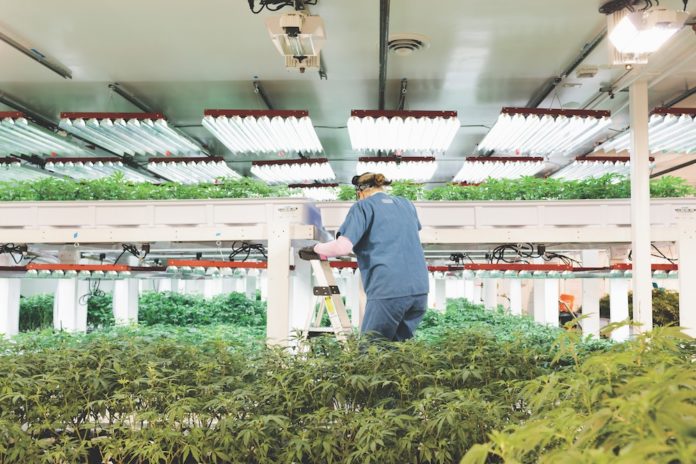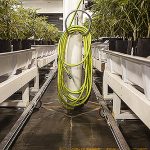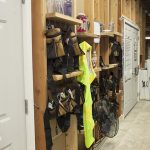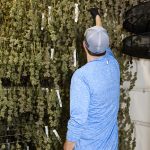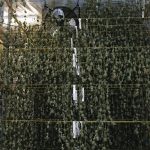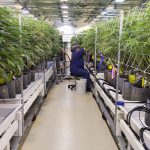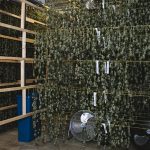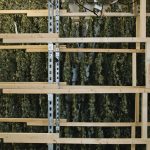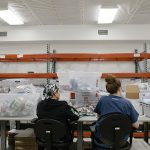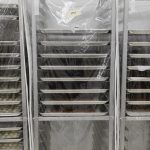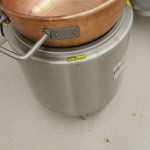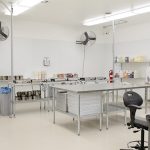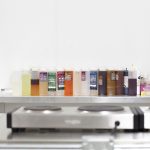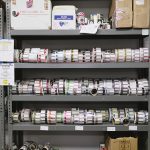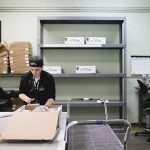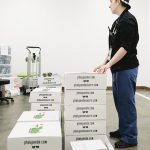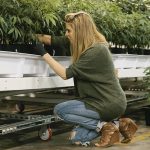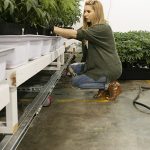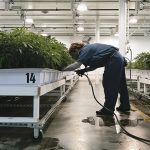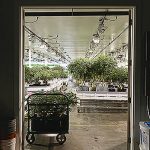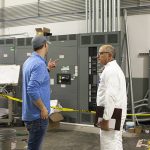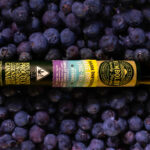Phat Panda from Grow Ops is smart, strategic, and dominating the Washington State flower market.
It’s been several months since I toured the Grow Op Farms operation, located in a massive 100,000-square-foot industrial building abutting the Spokane, Washington, train tracks, but it feels like yesterday. Grow Op is known in the industry by the name of its primary brand, Phat Panda, the num- ber one producer of flower in the state, but it also encompasses the company’s two other brands, Sticky Frog (concentrates), and Hot Sugar! (edibles).
CONDUCTED BY BOB MCKINLEY, an experienced marketer who founded the company in 2014 with his wife, Katrina, the two-and-a-half-hour tour was a master’s class in logistics. The operation was impossibly intricate, a multi-dimensional ballet of continuous cultivation, production, and process- ing that seamlessly hummed along as construction crews worked 24/7 shifts building out even more grow rooms in which to produce more of the company’s market- leading flower.
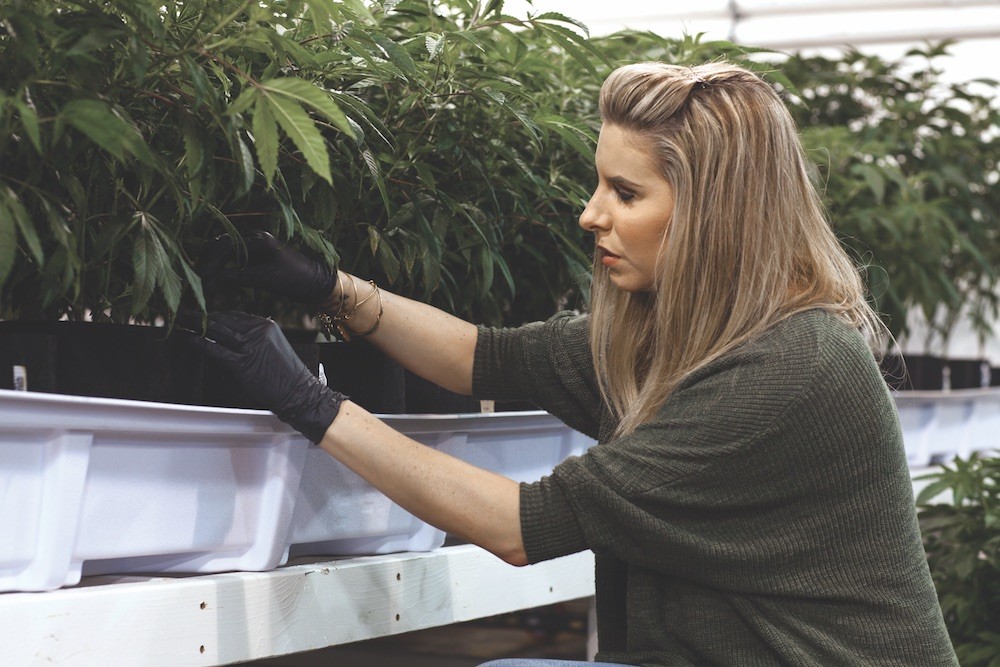
Cultivating, harvesting, processing, packaging, and shipping to retail stores throughout the state within environments tightly controlled by the seemingly all-knowing Washington State Liquor and Cannabis Board, Phat Panda’s operation displays military like logistical precision.
Compliance certainly is everything, but what makes Phat Panda even more impressive is the way in which the company entered the Washington State market in early 2015. Working against the prevailing market forces, the company quickly dominated its flower market and has preserved its status by maintaining its original price points, meeting controlled statewide demand, and maintaining a stellar reputation for consistency and quality among retailers and consumers. It sounds like a fairy tale, which the company may want to consider naming one of the thirty or so strains Phat Panda regularly has on the shelves.
It would be easy to suggest Phat Panda was simply in the right place at the right time, but that would fail to appreciate what the company truly accomplished. Starting with an initial investmentof $3 million, in a few short years Phat Panda became the largest flower producer in the state, a lead it has maintained ever since by plowing all profits back into operations. The way McKinley explained it, laying the proper foundation was essential.
WE’RE A KRAFT OR KELLOGG’S, A KEY COG TO YOUR SUCCESS
“When I did my original business model, I did it at $1,200 a pound [for flower],” he said. “Could I survive at $1,200?
The answer was yes, but could the still-immature Washington State market support such a price point?
“The first companies in the cannabis space here were hated be- cause they charged $18 a gram up to whatever they could get, and people would pay it,” said McKinley. “The growers were taking advantage of the retailers.”
McKinley saw an opportunity at his fingertips. “When we came into the marketplace in January 2015, the price per gram was around $8,” he said. “We were growing a lot, and I didn’t want to sit on it. I didn’t want slow growth; I wanted to go as high as I could go. So, when we started working with our first retailers, I asked them,‘What is the price you need to be at?’They told me, ‘If we could be at $5 a gram, we could move all of it and then some.’ An eighth would be $17.50 wholesale and retail for from $45 to $50.
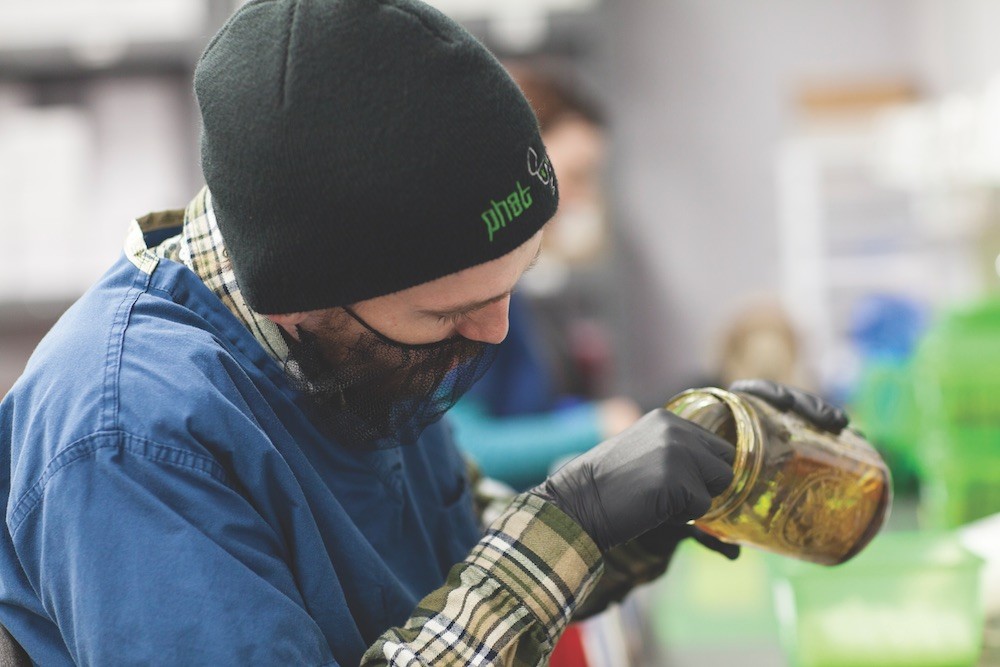
“So, we came in and basically readjusted everybody’s price,” he said. “We went straight to $5. It’s a part of the reason why people hate us. We changed the whole market and it helped us accelerate, but it also made the average growers come down in price.”
That was three years ago. “We haven’t had to change our pricing,” said McKinley. “I can still get $5 a gram, and we’ve been profitable enough to continue to grow.” The story is a living, breathing example of McKinley’s business philosophy in action: “Best product for the lowest price.”
Price was not the only thing Phat Panda had going for it.“Hav- ing our product in glass was the differentiation when we were new,” said McKinley. “We were also the first big indoor grower to have product for lots of stores at once.”The company sold only flower and pre-rolls to start. “Our first month, we sold $200,000 in product,” said McKinley. “We went to $600,000 our second month, stayed there for a few months, and were the first com- pany to hit $1 million a month in sales. We hit $2 million at the same time as our main competitor, but we had a big jump from $1.2 million to $2.1 million when our new rooms came online last year.”
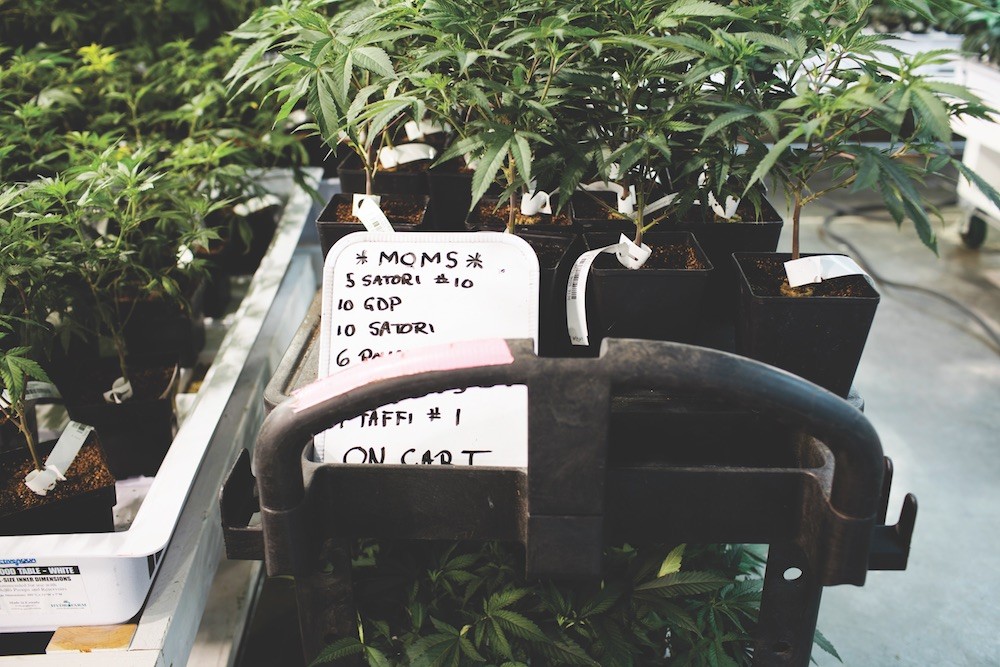
Five more grow rooms have come online since, with a capacity of about 200 pounds of dry, usable bud per room.
Remarkable Growth
At the time of my tour, McKinley said Phat Panda was producing an estimated 150 pounds or more of wholesale flower per week. “We grow the most flower in the state,” he said. Phat Panda remains the number two processor in the state month-after-month, just be- hind Northwest Cannabis Solutions. However, McKinley noted, 40 per- cent of Northwest’s sales are edibles, whereas Grow Op maintains a consistent breakdown of its three brands at 70-percent flower (Phat Panda), 20-percent concentrates (Sticky Frog) and 10-percent edibles (Hot Sugar!).
I GREW UP IN A GROCERY STORE, AND AT AN EARLY AGE I LEARNED THAT WHEN SOMETHING LEFT THE SHELF, THERE WAS ALWAYS SOMETHING TO REPLACE IT
Still, for what it’s worth, the two companies are virtually neck and neck. Each has generated more than $41 million in total sales, but less than $100,000 difference between the two consti- tutes a statistical tie. The third-most-profitable processor in the state claims less than $19 million in total sales.
Monthly and yearly tallies also indicate a two-horse race, with Grow Op and Northwest each bringing in more than $2 million in sales, a threshold Grow Op has attained four out of the past seven months, including the most recent three. Considering the falling prices for flower in the state, with the average having dipped as low as $7 a gram for retail, maintaining $2 million in monthly sales is no mean feat.
The long-term trajectory is upward. “In 2016, we generated just under $20 million [in sales],” said McKinley. “The first year was $8 million. Everything extra is put right back into the company.”
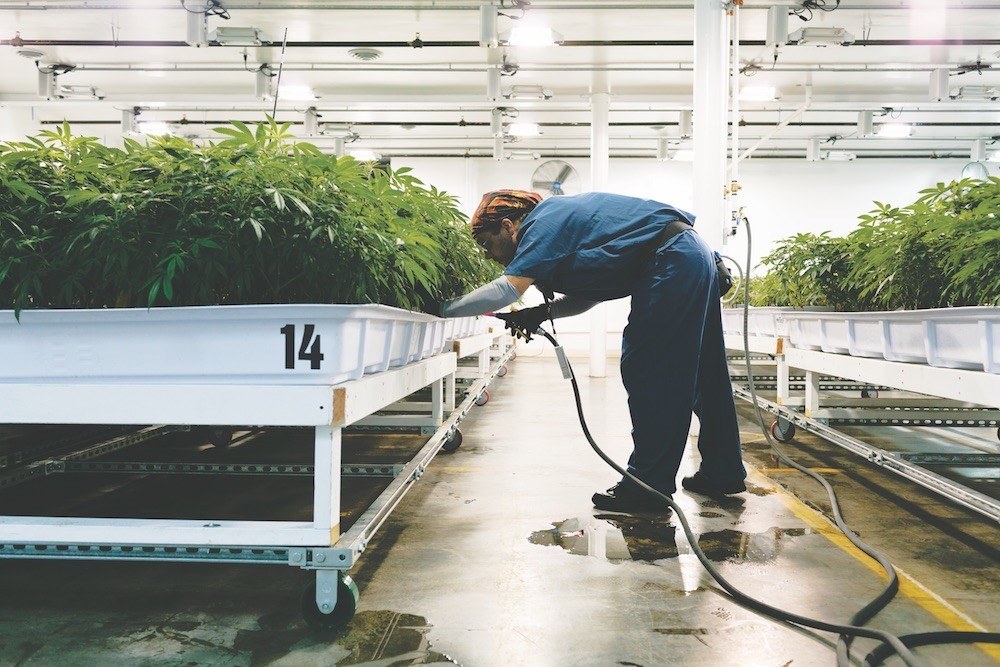
There is also a list of retailers waiting to receive Phat Panda flower. That’s exactly how McKinley likes it. “I grew up in a grocery store, and at an early age I learned that when something left the shelf, there was always something to replace it.. It wasn’t always the same brand, but maybe a similar product,” he said. “In our original business plan, we had it that we would always have enough product so we would never lose our spot on the shelf.As we’ve grown, that has meant not bringing on too many clients so we would never lose that spot on the shelf. Some stores run out, but we always replenish them within twenty-four to forty-eight hours.” Five trucks deliver products to more than ninety stores weekly.
As far as relations with partner retailers, the company takes pride in being a rare anchor brand in the industry.
“We look at ourselves as a cornerstone brand in your retail shop,” said McKinley. “We’re a Kraft or Kellogg’s, a key cog to your success. If we’re in your store, we’re going to dominate and take 15 to 20 percent of your retail sales. It’s inevitable. That’s how many people will come and ask for it. It’s why we have ninety stores on our waiting list. So many people go into stores asking for our products, and we can’t service them.”
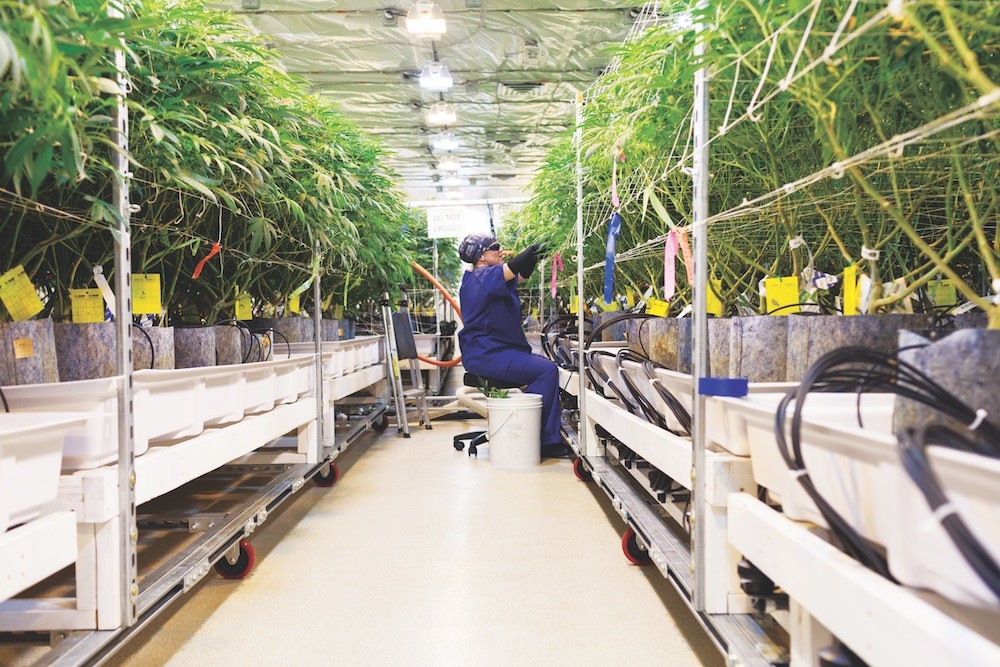
Future Outlook
Washington state recently increased the number of retail licenses it will approve. Five hundred eight licensed retailers current existist in the state, with more possibly to come. McKinley is happiest when he knows he will sell out of flower every month, and there is still room for growth. “The maximum revenue we will be able to derive out of this mar- ket will be about $5 million a month if we are running at peak efficiency with edibles and concentrates,” he said. “Somewhere between $4 million and $5 million a month.”
Though it remains a bona-fide flower king in the state, Grow Op is looking to increase its concentrates and edibles market share. Currently, its Golden Pineapple and OG Chem strains are consistent standouts, and Phat Panda’s pre-rolls are so dominant McKinley calls the company the “Baskin-Robbins of pre-rolls.” That’s an apt comparison, considering Phat Panda produces 50,000 to 80,000 every week in twenty flavors.
WE LOOK AT OURSELVES AS A CORNERSTONE BRAND IN YOUR RETAIL SHOP
The company also produces well over 15,000 vape pens each week and continues to innovate with products like the Pocket Panda, a sleek new pen that features patent-pending technology and retails for less than $80. As well, a half-dozen strain-specific concentrates are offered under the Sticky Frog brand. As far as edibles go, Hot Sugar! offers flavored THC powder in 10mg servings, more than twenty-five flavored 10mg Panda Candies, and five flavors of caramels. Drink-enhancing Panda Shots are coming soon.
The company also sells thousands of dollars of Phat Panda merchandise monthly, a testament to the reach of the brand across state lines. McKinley is singularly focused on making sure the Washington State business continues to dominate the mar- ket, but expansion into other states is not off the table. “I think we will at least be able to carve a niche on California,” McKinley said modestly. He’s in no rush, but he readily admits “lots of people like our brand.”
And well they should. McKinley’s focused and businesslike discipline has allowed the company to expand without outside investment. Meanwhile, his master grower, Andrew Guy, continues to produce acclaimed strains consumers appreciate. Flower is produced from clone to nug in pristine environments us- ing time-tested standard operating procedures, and everything tested on-site by Trace Analytics before hitting the market. The company spends more than $10,000 a month on pest-killing bugs—just one effort it undertakes to ensure all its products are pesticide-free. McKinley is on a “super-huge pheno hunt” in a farsighted effort to protect his intellectual property by identifying the specific dominant traits he wants to develop in his plants.
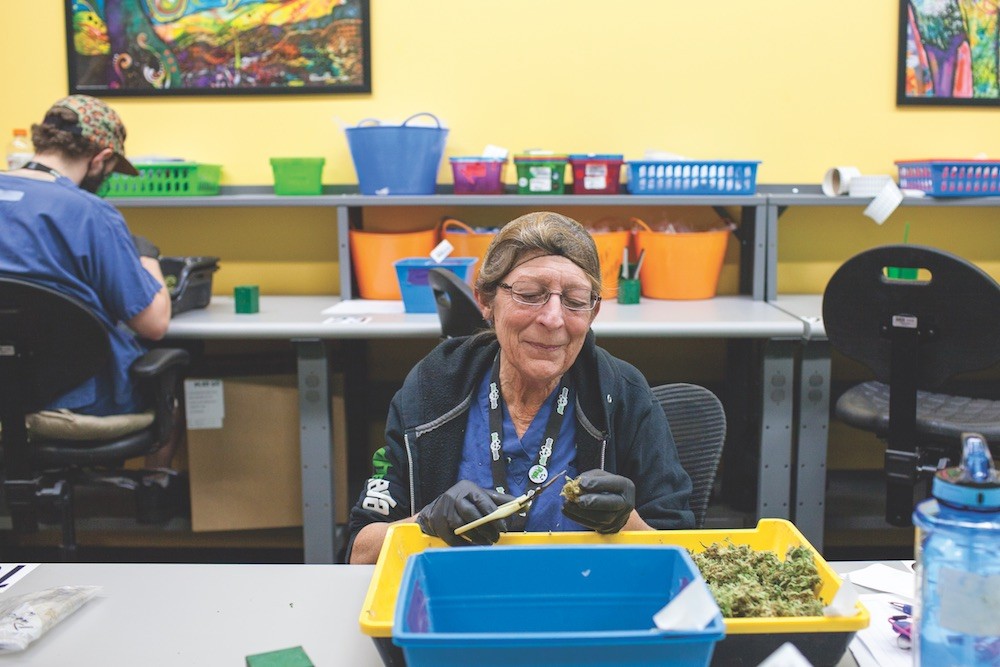
Grow Op is one of the industry’s few “large-scale boutique” success stories with an even brighter future, which might make it a tasty target for takeover. But with more than 1,000 people dependent upon the company staying in business, as well as a multitude of consumers clamoring for their products, McKin- ley and his wife are super-protective of what they have created.They also are the type to see a project through to completion. “We want to be number one in every sector,” is how McKinley put it.
“We want to be number one in every sector,” is how McKinley put it.








